Peter MALONE
Saturday, 09 October 2021 13:00
Paris
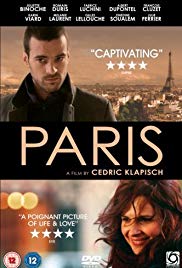
PARIS
France, 2008, 126 minutes, Colour.
Romain Duris, Juliette Binoche, Fabrice Lucchini, Melanie Laurent, Karen Viard, François Cluzet, Gilles Lellouche, Albert DupontelL.
Directed by Cedric Klapisch.
Paris might be seen as something of a love letter to the city. It was written and directed by Cedric Klapisch, well-known for his trilogy about young students in Europe, L’ Auberge Espagnol, Russian capital and Chinese Puzzle.
This is an ensemble film with a top French cast, the sympathetic performance by Romin Duris as a dancer with a heart condition. Juliette Binoche plays his sister. There is the story of a Professor of history, becoming disillusioned with himself, played by Fabrice Lucchini. François Cluzet plays his architect brother. The Professor becomes infatuated with one of his students, texting her, eventually meeting her, Melanie Laurent.
The complex plot, with many strands in characters, is in the vein of many of the films by Robert Altman, Altman-esque in its structure.
There are many views of the city, panoramas as well as the details of the streets and interiors, many collages of activity, the audience being immersed in the city and its life.
One of the principal areas of activity is that the market, characters going to the stalls and shops there, some interactions between the people who run the stalls.
The central characters are all interesting, which keeps the audience attention, holding them in the memory while the screenplay goes to another of the narrative pieces.
1. The title? The film as a love-letter to Paris? A portrait, an interpretation?
2. The visuals, the variety of panoramas of the city, the prominent landmarks? The ordinary Paris, the streets, apartments? Immersing the audience in the city?
3. The collage of the variety of activities in Paris? The range of ordinary people encountered? Occupations, shops, the markets, taxi drivers…? The musical score?
4. The structure of the film, the variety of characters, pieces, episodes? In the tradition of Robert Altman?
5. The cross-section of characters and their interactions and connections?
6. Pierre, the dancer, scenes of him dancing, his career, alienation from his mother, dependence on his sister, the diagnosis, his heart disease, need for a transplant? Living alone, his loneliness, looking from the balcony? Seeing the girl? Interactions with his sister, telling the truth, telling the children? His watching people, creating stories? The sexual encounter? His going to the party, dancing, collapse? The phone call inviting him to go to the hospital for the transplant? In the taxi, passing the characters from the film, his looking up to the sky?
7. A police, the older sister, the three children, the mystery about their father? Her work, interviews, with the Africans, her asking for time off, the harsh reactions? The time spent with Pierre? Going to the market, the interviews, the encounters with Jean? The relationship with him? The farewell to Pierre?
8. Roland, his lectures, older brother, his relationship with his younger brother, going to the building site? His meeting the of professors, not wanting to be like them? The television producer, persuading him to go on camera, the filming of the episode, Baudelaire and French society? His breakdown? Going to the psychiatrist, not believing, yet needing? The infatuation with the girl, watching her, sending her texts, meeting her, the sexual encounter? Her casual attitude, her boyfriend and inviting him to see her life? Resuming the television? Sharing the joy of his brothers child? The brother, challenging him about being normal, his discussions with his wife?
9. At the market, the range of characters, the stalls, fruit, fish? The men, rowdy? The women? Gene and his wife, the separation, her leaving, the bicycle crash and her death? His grief? The interactions amongst themselves, out at night, the club, singing, the sexism and the wheelbarrow episode the man just wanting to have fun? The proposition, his not being able to fulfil and his walking away?
10. The children, playing, at school, friendships, with Pierre, with their mother?
11. The Africans in Paris, where they lived, the contrast with Cameroon, the preparations to come to Europe, the cost, the contacts, on the shore, the boat, the engine? The news of the drowning? Yet the mantra Cameroon and his photographing Notre Dame?
12. The supercilious woman in the shop, hard on her assistance, please in the customers, the girl from North Africa, her qualities, her being admired? And the encounters with
Pierre?
13. Audiences having the opportunity to live in and being immersed in Paris, the well-known Paris, ordinary day by day Paris?
Published in Movie Reviews
Published in
Movie Reviews
Saturday, 09 October 2021 13:00
Awakening of Motti Wlokenburch, The
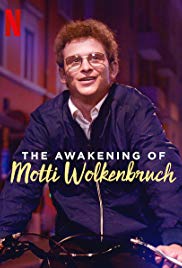
THE AWAKENING OF MOTTI WOLKENBRUCH
Switzerland, 2019, 95 minutes, Colour.
Joel Basman, Noemie Schmidt, Udo Samel, Sunnyi Melles, Inge Maux.
Directed by Michael Steiner.
This is a Swiss film with a Jewish subject. It would play well with liberal Jews all over the world but may not be so popular with more Orthodox communities.
Joel Basman is the young Motti, living with an archetypal Jewish mother (with the touch of the caricature throughout the film) and a benign father. Her intention is that he meet a nice girl and that a marriage be arranged. She makes several attempts. Motti is finding his own life, resisting his mother’s arrangements. He is also going to college, sees a girl there and is attracted, meeting, discussing, his awakening and feeling liberated.
Meanwhile, with his refusal to agree to arrangements to meet girls for arranged marriages, he is advised to go to Israel, meets a very liberal group concentrating on contemplation and chakras, has a sexual encounter was a girl there, returns home.
When he does have an encounter with the girl back home, she states she is not ready for a relationship. He is upset, bewildered, leaves home, his mother telling the news that he had been killed in an accident, his father inviting him to dinner. His future?
1. A Jewish story? Coming-of-age? Orthodox Jews? The Swiss setting?
2. The Swiss city, homes, synagogue, rabbis’ offices, college? The musical score?
3. The title, the focus on Motti, his appearance, Orthodox Jewish, his age, hair, glasses, beard? The strictness of his household? The dominance of his mother? The benign attitude of his father? Expectations about his marriage? The impact on him, wanting to be independent, going to college, lectures, the encounter with Laura, his fascination, following her?
4. His parents, the character’s mother, the archetypal Jewish mother, emotions, tantrums, domination, of her husband? Traditions and regulations? Arrangements for Motti to meet girls, formalities, the parents, the two not knowing each other? The mother and the young girl, her rebellion, she and Motti talking, the plan to pretend? His mother is upset, the car crash, breaking his glasses, independently choosing new glasses frame, the advice to trim his beard, take his beard off? The effect of the transformation?
5. Working with his father, economics, insurance? The meeting with the dying woman, using the cards to tell his future, her cancer, wanting to charity, her influence, his final visit to her?
6. Laura, her character, interest in Motti, Yiddish, lectures, talking, her work in the club, his visits? His breaking free? Drinking, in love? Imagining bringing Laura home and his mother’s reaction – and the later reaction in reality?
7. Motti and his friend, the discussions, the encounter with the girl and their planned engagement?
8. Motti, his rebellion, the meals, the discussions, antagonism towards his mother, her carrying on? Going to the rabbi, his recommendation to go to Israel?
9. The visitor’s, the liberal rabbi and his wife, the exercises and the clientele, very open? The interactions with the girl, the sexual encounter? His return home?
10. Contact with Laura, the return from Israel, the night together? Her telling him that she was not ready for a relationship? His reaction?
11. The fuss at home, his mother disowning him, his father’s support? Seeing him sitting on the park bench and the camera rising – his future?
Published in Movie Reviews
Published in
Movie Reviews
Saturday, 09 October 2021 13:00
Advocate, The
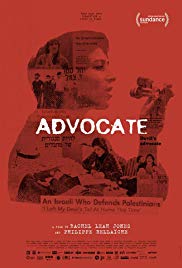
ADVOCATE
Canada/Switzerland/Israel, 2019, 108 minutes, Colour.
Directed by Philippe Bellaiche, Rachel Leah Jones.
This documentary, Advocate, is a portrait of Israeli lawyer, Lea Tsemel, still working as an advocate but defence counsel for Palestinians. While she is a strong-minded and powerfully expressive advocate, she does not always win, but makes strong stances for justice.
We initially see her active in the present, taking on the cases of Palestinians, especially in the aftermath of two boys, letting loose, shooting at an Israeli bus and its passengers. One of the boys is shot, the younger arrested and treated harshly by the police, especially in demanding interrogations.
Initially, the information about the case is not clear, especially the ages of the two boys, whether they had guns, whether they intended to kill, how they should be interrogated, how the case would come to court. Lea Tsemel and her staff, in collaboration with a Palestinian advocate, spent a great deal of time researching the case, examining the arguments, making a plea for more humane treatment.
At the same time, she takes up the case of a woman who is accused of sedition because she had invoked the name of Allah.
Audience sympathy is evoked for the two accused – and, especially, since each was found guilty.
The film outlines her biography, her reaction as a student and fighter in the Six Day War, a change of consciousness, challenges, imprisonment, a supportive husband and children, her husband having gone to jail in the past, sympathetic interviews with him as well as with her children. The film incorporates quite a deal of historical footage of the history of Israel, the wars, social upheaval in Israel over the decades as well as details of Lea Tsemel herself.
There are a lot of visuals of the legal profession, judges, lawyers, prosecutors. And there are a lot of visuals of ultra-patriotic Israelis declaring their stances, attacking Arabs, the Palestinians.
Interestingly, this documentary won the prize in 2019 at the Doc Aviv Festival.
Published in Movie Reviews
Published in
Movie Reviews
Saturday, 09 October 2021 13:00
After the Wedding/ 2019

AFTER THE WEDDING
US, 2019, 112 minutes, Colour.
Michelle Williams, Julianne Moore, Billy Crudup, Will Chase, Abby Quinn, Alex Esola.
Directed by Bart Freundlich.
Audiences may remember the Danish film of the same name, from 2007, starring Mads Mikkelson, directed by Susan Bier. It made quite an impact at the time.
Part of the impact was the decision to do an English-language remake. The original was adapted and the new film directed by Bart Freundlich (The Myth of Fingerprints, Trust the Man). Both of these films starred his wife, Julianne Moore, and he directs her in this film as well. This version stays close to the original but is interesting because of one particularly significant change, the gender of the principal characters is reversed, so this becomes more of a story about women than the original which focused on men.
This film has a strong cast, not only with Julianne Moore very dynamic, but a subtle and sometimes mysterious performance by Michelle Williams, well worth experiencing, the central focus of the drama. Included in the cast is Billy Crudup as Julianne Moore’s husband and Abby Quinn as his daughter.
The opening sequences are set in India, some wonderful aerial shots of the landscapes, of the city, finally coming down to settle on children in prayer at an orphanage – and then their going to play soccer. Michelle Williams is Isabel, who has come from the United States, living and working in India for many years, supporting the orphanage but on the lookout for funding, absorbing Indian traditional prayer and contemplation, very much attached to the young orphans. .
The film opens with news of potential funding from the United States, from a wealthy benefactress, Teresa, (Julianne Moore), a busy head of a very successful company which she has developed. She is married to Oscar (Billy Crudup) an artist, also successful. His daughter, Grace (Abby Quinn) is about to be married. Teresa demands that Isabel come in person to New York to negotiate the financial support – and she is invited by Teresa, over-preoccupied with detail of the wedding reception, to come to the wedding.
The film has some emotional complications, the audience not expecting them but appreciating the attention to little details, expressions, looks, which will reveal the complexities (and which the review will not reveal).
There are many dramatic and emotional moments in the film. They are not rushed. The film moves with something of a quiet pace even as the drama intensifies.
This is a film which not only interests the audience in the characters but even more so in their interactions – which emerge, as the title indicates, after the wedding.
1. The title? Expectations? Revelations? Resolution?
2. The Indian sequences, the aerial views, the town, the orphanage, the orphans of prayer, play? The focus on India? Isabel, her presence, dress, the company, her work, assistant, the need for funding?
3. The New York settings, the streets, hotels, offices, homes? The wedding? The restaurants? The woods and the art? The musical score, songs?
4. A humane film, relationships, broken relationships, tests, but the depth of love?
5. Isabel, her character, presence in India, Indian customs, bonds with the orphans, with Johnny? His story? Her dedication, the staff? The issues of money, the possibility for funding, the demand for her to go to New York? Taking the documents, Jonathan in the taxi, the welcome, the hotel and the lavish room, going to the office, the encounter with Teresa, her being very busy, the businesslike discussions, the invitation to the wedding, her arriving late?
6. Teresa, in the car, singing with Lady Gaga, busy, creating an empire, wealthy? Her relationship with Oscar, at ease with him, intimacy, the bath? Yet not telling him her health diagnosis? Her secretary, harshness with her? Her relationship with Grace? The revelation that she was stepmother? The wedding, arrangements, issues of lobster…? Oscar, his personality, his art, preparing the exhibition, phoning Grace? The presence of the twins, their age, play?
7. Teresa, the discussions about the orphanage, her choice of Isabel, the later revelation about her researching her thoroughly, knowing who she was, Grace’s mother? Inviting her to the wedding? Her illness, Grace treating her as her mother? The issue of money, the conditions, the meeting in the signing of the documents, her illness, support from Oscr? Her death and funeral?
8. Grace, her age, working in the office with her mother, Jonathan and his work in the office, the engagement, and love? Her devotion to her parents? The preparation for the marriage, the discussions, moving despite her parents’ disapproval yet their not saying so? The ceremony, declarations of love, the dinner, the speeches, the tributes? The later tension with Jonathan, wondering whether she had made a mistake, the loose end of Jonathan and reconciliation or not?
9. Isabel, seeing Oscar, the glances, audience suspecting the truth, knowing the truth? The story of her past, aged 18, pregnant, the birth of the daughter, their agreement for adoption, her leaving, Oscar returning after the months, keeping the baby, Grace saying Teresa was her choice of stepmother?
10. Isabel going to the house, Teresa and Oscar talking with Grace, the argument, the impact on her? Isabel visiting? Grace going to the hotel, seeking Isabel out, the restaurant, the frank talk?
11. Teresa, the promise of $20 million, the demand that Isabel stay, Teresa planning, that she should be there for Oscar, for Grace, for the business enterprise? Her taking the twins to Washington and leaving Grace and Isabel free?
12. Teresa dying, her emotional outburst? The funeral? All present?
13. Isabel going back to India, the money, her assistant? Talking with the boy, his wanting to stay with his friends?
14. Human nature, good and bad decisions, circumstances, mistakes, possibilities for redemption?
Published in Movie Reviews
Published in
Movie Reviews
Saturday, 09 October 2021 13:00
Laundromat, The
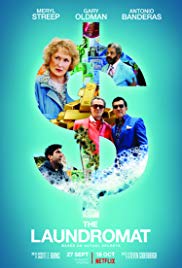
THE LAUNDROMAT
US, 2019, 95 minutes, Colour.
Meryl Streep, Gary Oldman, Antonio Banderas, James Cromwell, Robert Patrick, David Schwimmer, Jeffrey Wright, Sharon Stone, Nonso Anose, Matthias Schoonaerts, Rosalind Chao.
Directed by Steven Soderberg.
We are all familiar with the phrase money-laundering. While they have not thought of a specific name for the processes for this laundering, this interesting and entertaining critique gives a justification for referring to The Laundromat.
Several years earlier, there was an eruption in the business world – and in the political world – with the release of what were called The Panama Papers. They provided expose of extensive and worldwide wheeler-dealing, sham companies, interconnected fraud, bribery and the exploitation of investors, insurance-failure victims, all over the world.
Obviously, this is the kind of material that is fascinating in documentaries. However, writer S.Z..Burns (The Informant, The Report) and director, Steven Soderberg, have taken another route for an expose. They blend tragic moments with comic moments. They have a touch of stage and television vaudeville. They have melodramatic intrigue. They have some high drama with International authorities and investigations. They have vignettes about the exploiters as well as the victims. And they have Meryl Streep.
The film opens arresting live with a spangled-coated duo doing a kind of comic routine to camera, giving an introduction to some of the money exploitation themes. They are played entertainingly by Gary Oldman (with German accent) and Antonio Banderas. They recur during the film, living the high life, wealthy, no scruples, and revealed to be the two men behind the Panama company at the centre of the money-laundering. They make an entertaining duo – even as we are disgusted by their irresponsibility, refusal to accept any blame, justifying their swindles as if swindling was absolutely normal.
There is quite a contrast, on the other hand, with a story about a husband and wife (Meryl Streep and James Cromwell), going on a cruise, a freak wave capsising the boat, some deaths and casualties – leading to an exploration of the insurance industry, blame games, rationalisations for not paying, the discovery that companies were sold and resold in fact, the originals lost in shell companies.
Meryl is a determined investigator, taking her family to Las Vegas, thinking she had inherited an apartment only to find that there are more swindles. Discovering that companies based in the Caribbean, she ventures there, relentlessly pursuing her investigations (with a final expose that might surprise some in the audience but, those with an eagle eye for faces and recognition, will know what might be coming).
The chapters of the film are indicated as “Secrets� which are being explored. So, there are a series of interesting vignettes, one focusing on Jeffrey Wright as a Caribbean entrepreneur, escaping to the US, exposed as having two families, imprisoned. Rather more quietly, David Schwimmer appears as a neighbourhood lawyer who, to save money, has invested in small insurance companies only to find that he has been left stranded with his customers, with no capacity for investigating the sales, the sales, further sales…
And, some of the vignettes, go international, an African millionaire living the high life but getting tangled in the vengeance of his family. There is also a British businessman (Matthias Schoonaerts) going to China, doing deals, only to find himself caught by a dignified murdering member of the higher echelons (Rosalind Chao).
Steven Soderberg has made all kinds of interesting films and exposes for 30 years and has obviously enjoyed filming this complex story. Of course, it is left to the audience to do the moralising and be disgusted by the exploitation that they have watched – except, that at the end of the film, there is a somewhat intense communication to the audience about the morality, spoken by Meryl Streep. As a British reviewer said, most aptly, “when Meryl speechifies, we listen�.
1. The title? Money-laundering? World scale?
2. The work of the director, his interest in social issues, exposes?
3. Audience knowledge of the Panama Papers, the release, the information, exposing of companies in shell companies, international fraud, political implications?
4. A satiric comedy instead of a straightforward documentary? How effective for the audience, learning about the Panama Papers and their consequences? A way into this amoral world via humour and expose?
5. The range of settings, Panama, the US, upstate New York, Las Vegas, the Caribbean islands, China? The overall international impact?
6. The comic touches, the introduction of Mossak and Fonseca, German and Hispanic, Gary Oldman and Antonio Banderas, the comic routines, straight to camera, confiding in the audience, the lack of any moral perspective, money, descriptions of processes, companies, shell companies, fraud? The reappearance is on the double turn, like a television show? Seeing them at work in Panama, there are actual identities in real life, there fraud? The rest, carefree, denials of all responsibility? In prison – released? Smooth operators?
7. The contrast with New York State, Ellen and her husband, their marriage, the excitement of the boat cruise, the neighbours, ordinary people, the freak wave, the captain, capsising, Ellen and others trapped under the boat, getting free, the deaths?
8. The issue of insurance, Ellen and her investigations, learning about the company, the reselling of companies, the difficulties of tracing those responsible? The death of her husband, taking her daughter and grandchildren to Las Vegas, the hopes of the apartment, the window to remember her husband, the smooth operator and selling the apartment to Russians, Ellen and her discussed?
9. The captain of the ship, the accident, desperation, meeting with the insurer, his advice, the research, discovering the selling on of companies? The shell companies?
10. Ellen, discoveries about the Caribbean, her going to Florida, going to the islands, her search? The staff at Mossak Fonseca, the scapegoats, the woman getting promotion – looking suspiciously like Meryl Streep? Her intervention, whistleblowing? The final revelation?
11. The Caribbean, the wheeler dealer, his family, escaping to the United States, his other family waiting at the airport, his being arrested, imprisoned?
12. The African story, the extent of shell companies from the United States to Africa? The entrepreneur, his mansion, the pool, his daughter discovering her flatmate, the affair with her father, a threatening denunciation to her mother, her father trying to buy her off, giving her the management of the company? The arrival of the wife? Her concern? The flatmate and the revelations? The family explosion?
13. China, the extent of the frauds, the businessmen visiting China, going to the wealthy businesswoman, her polite manner, her assistant, the discussions, the hold over each other? The plan, the doctored drink, the businessman’s collapse? The woman going to the official meeting, the speeches about corruption, the head and his having to escape? The woman, arrested, imprisonment?
14. The extent of the money-laundering, audience amazement? The impact of the humour, the send ups of the spoof, Mossak Fonseca and their getting out of jail so quickly?
15. Meryl Streep, her strong moralising speech at the end – and the audience listening?
Published in Movie Reviews
Published in
Movie Reviews
Saturday, 09 October 2021 13:00
It Takes a Lunatic
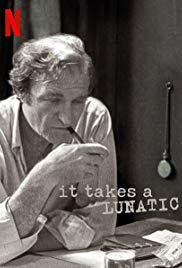
IT TAKES A LUNATIC
US, 2019, 126 minutes, Colour.
Directed by Billy Lyons.
The title comes from a quotation about the subject of this very interesting and enjoyable documentary, Wynn Handman. He was not exactly a lunatic – but, the enterprises he took on showed creative genius and artistic risk.
This is essential viewing for anyone interested in American theatre and, especially, New York theatre and Wynn Handman’s acting school.
Wynn Handman is not necessarily a household name even for those interested in theatre. This documentary was made when he was 97 years old, born in 1922. There is biographical information given about him and his family, his relationship with his father (and a clash with him which meant that he did not speak with him before he died). The clash was to do with military service and his physical situation but Handman joined the Coast Guard and, during World War II, was in the Navy.
The film has a very interesting device, a class by Handman talking about his own discovery of inner self, communication, acting and performance, illustrating it by his Navy experiences which are also visualised.
He set up The American Place Theatre in New York City, in existence for 40 years, audiences coming by subscription rather than tickets and a venue for all kinds of experimental theatre and opportunities for those he trained to get performance experience.
There are a great number of scenes of Handman giving classes, the small theatrette room, many close-ups of him giving advice.
While he taught and coached many actors over the decades, a number of them reached prominence with him or on the cinema screen or television. There are comments by such actors as Richard Gere, Alec Baldwin, Chris Cooper, Joel Grey, Michael Douglas, Lauren Graham. There are sequences of plays performed especially with Frank Langella, and a number of playwrights including poet Robert Lowell, a number of African- American experimental writers, Tibor George and his play Cannibals which was hugely successful in Germany, an examination of the German conscience in the light of World War II. He encouraged Eric Bogosian, John Leguizamo, Aasif Mandvi to venture out in one-man performances.
The narrative goes back to Handman’s applications to go to theatre school, going out on his own, and his own assistant who set up the Women’s Project for theatre.
And, he was still giving four classes a week at the age of 97.
An excellent tribute to him and an introduction to American theatre, off-Broadway.
Published in Movie Reviews
Published in
Movie Reviews
Saturday, 09 October 2021 13:00
Devil's Candy, The

THE DEVIL’S CANDY
US, 2015, 79 minutes, Colour.
Ethan Embry, Shiri Appleby, Pruitt Taylor Vince, Kiara Glasco, Tony Amendola, Leland Orsa.
Directed by Sean Byrne.
This is a brief, often graphic, horror film, quite effectively made in its genre, written and directed by Tasmanian, Sean Byrne, who had made number of short films and then the Australian feature, The Loved Ones. After The Devil’s Candy, no more filmmaking.
It has a strong cast, led by Ethan Embry (a long way from his previous juvenile roles) as a hippy style artist looking for a new house and a studio with his wife and daughter, Shiri Appleby and Kiara Glasco. The audience has seen his avant-garde style of painting.
The audience has also seen an insane fat man, Pruitt Taylor Vince, playing electric guitar, his mother pulling out the plug, his killing her, travelling to a motel, playing the guitar again with the police coming to warn him against the noise.
All seems reasonable with the new arrangement, the family moving in, the artist doing his work. However, he is troubled by voices, coming from the walls of the house which was previously home of the guitar player. We have seen a crucifix on the wall and its being turned upside down. We also hear the man in his motel room listening to a television broadcast with a priest explaining the action of the devil. There are also glimpses on television of papal ritual ceremonies.
The artist is possessed by the spirit of the sinister man who also comes to visit explaining that it is his family house – but he is rejected by the artist. The daughter is more sympathetic.
What happens is that the artist is possessed by the devil,, the spirit of the sinister man, who goes around abducting children from playgrounds, killing them, burying them. He then threatens the artist and daughter. While the artist is possessed, he loses a sense of time and his daughter is disappointed in him. But he also paints the crimes, the anguish of the abducted children, including his daughter. They escape his first attempt at attack, the police helping them, but those on guard outside the house killed and the man entering the house, tormenting the daughter, confronting the artist and his wife, shooting, setting the upstairs on fire – with the artists finally rescuing his daughter who has to leap through the flames.
The artist had been offered a financial deal by the manager of The Belial Art, himself a sinister devil figure.
Brief, grim, a rather creepy narrative and performance by Pruitt Taylor Vince, for horror fans only and very well-made for this target audience.
Published in Movie Reviews
Published in
Movie Reviews
Saturday, 09 October 2021 13:00
Are We Not Cats
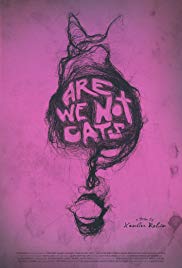
ARE WE NOT CATS
US, 2016, 77 minutes, Colour.
Michael Patrick Nicholson, Chelsea Lopez, Michael Godere.
Directed by Xander Robin.
This brief, rather bizarre, drama was first made by the same director and central actor as a short film. The expanded version was presented at various festivals and won prizes at Underground Cinema Festivals.
Michael Patrick Nicholson plays a worker on a garbage route in New York City, goes to visit his parents who are leaving for Arizona, inherits his father’s truck. He gets a job driving an engine for delivery in the North, is persuaded by the man who ordered the engine to give him a lift. He also invites him to a bizarre club, lots of noise and music. He encounters a young woman there, finds her attractive.
The film continues the narrative of the relationship between the two. For some reason, he starts to grow more body hair, as well as discovering various welts on his back. She, rather emaciated and wearing a wig, also seems unwell. It emerges that she has swallowed a great deal of her hair, collapses. He calls the doctor but, while waiting, operates on her himself and removes an enormous hairball.
She is taken to hospital and recovers. He is taken to hospital, is warned that he could have been charged with manslaughter. He goes to visit her, bringing her the wig there, she putting it on him, their both recovering.
This is offered to the audience to make of it what they will.
Published in Movie Reviews
Published in
Movie Reviews
Saturday, 09 October 2021 13:00
Suzi Q
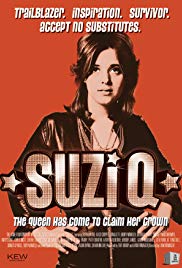
SUZI Q
Australia, 2019, 98 minutes, Colour.
Directed by Liam Firmager.
Suzi Q is Suzi Quatro. Well, that was unnecessary. Who else should she be?
This is a journey back into the history of the Rock ‘n’ roll Hall of Fame. Actually, this is only partially true – Suzi Q’s journey is ongoing, interviews in 2019 and the scenes of her last concert which, in fact, was in early 2019. Hers is definitely an ongoing story. And, interestingly, this is an Australian-made documentary.
Back we go to the city of Detroit in the 1960s, Suzi is one of four sisters, plus a brother, Catholics in the city of car manufacture. Even then, she was more than a lively presence. She didn’t continue at school, but led a band, with her sisters, The Pleasure Seekers, and made their mark. And, this documentary has quite a number of testimonies to Suzi and her abilities, her leadership and success – Joan Jett, Debbie Harry, Alice Cooper, Henry Winkler and many, many others.
It would seem a pity to reach one’s peak before the age of 20 but that was a danger for Suzi. However, out she went, going solo, attracting a great deal of attention – especially, as many note, the large electric guitar that she was given, almost as big as herself. There is frequent comment throughout the film that she was a pioneer, a female rock ‘n’ roll star before others, offering strong leadership to succeeding singers.
The film takes an interesting linear perspective on her life and career, getting her established in the US in the early 1970s, the various musicians that she was associated with. But, it was a visit to London, feeling quite lonely there as she explains, that she collaborated with a range of song writers and managers.
It should be noted that Suzi Quatro herself is a very genial interviewee, especially in more recent years, lots of observations, lots of commonsense, lots of appreciation for the past – but, while her sisters are interviewed and sing with her in those early days of The Pleasure Seekers, she feels that she was cut off from them in many ways, that they, and the rest of the family, could not talk any words of loving bonding, words of appreciation for her life, her talent and her skills. They can do this about her, but not to her. Yet, towards the end, there she is on stage singing and playing with them.
She was quite a hit in the 70s and there are scenes of her many tours, including her first visit to Australia. She toured the US but did not achieve the popularity there that she might have imagined. Throughout the film, there are excerpts from many of her songs and statistics coming up on screen indicating where the particular song landed on various national charts.
One of her main experiences of these years was several seasons on Happy Days – and a great variety of comments but, principally, affirmation from Henry Winkler. She found that she could act and enjoyed performing – but, ultimately, felt that it was taking her away from her concerts and tours.
In the 90s, she had a new venture, on stage in England, as Annie Oakley, to very good reviews, in Annie Get Your Gun and playing in several pantomimes. She also co-wrote and performed in a musical about the 1930s and 40s American actress, Tallulah Bankhead.
No lack of variety in opportunities in her life. And, there was a marriage, two children. While it didn’t last, she is very proud of her children with one of them, Richard, pressuring her so that he could write a song for her.
So, a re-visit for the fans – and some opening up of Suzi Q’s life and career for those who are on the periphery of rock ‘n’ roll or perhaps for many who have not even reached the periphery.
Published in Movie Reviews
Published in
Movie Reviews
Saturday, 09 October 2021 13:00
Zombieland: Double Tap
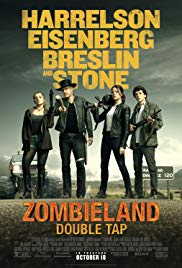
ZOMBIELAND: DOUBLE TAP
US, 2019, 99 minutes, Colour.
Woody Harrelson, Jesse Eisenberg, Emma Stone, Abigail Breslin, Zoe Deutch, Avan Jogia all, Rosario Dawson, Luke Wilson, Thomas Middleditch.
Directed by Ruben Fleischer.
At least you know where you stand (or sit) by the title! You are in Zombieland US, where a virus has infiltrated the majority of the population who are now the equivalent of George A Romero's Living Dead, preying on the living and devouring them if they can (though they can run fast, chasing the living, rather than lurch as they do in Romero's films – which, it seems, is why the fat people are the first to be caught and eaten!).
Of course, not everyone wants to see zombie films whether they are serious or funny. This one is funny. There have been some scary movie spoofs but they tend to be a bit along the scratch concert line, hit and miss jokes – and sometimes aiming at the lowest common denominator.
Zombieland is much more cleverly written. It parallels and parodies the living dead conventions but has a lot of wisecracks, especially with movie references, so that there are frequent smiles and laughs.
With the bigger budget than the cheap parodies, the sets are more impressive, especially the climax at a fun park where the cast go on a literal rollercoaster to escape the zombies. And the cast is very good. Jesse Eisenberg gives yet another variation (no, that is too strong a description because he is much the same every time) on his wimpish, dorkish persona which he does so well. He speaks the voiceover narration and his delivery and timing are just right in describing what has happened to the world, how he ticks as a phobia-ridden young man (whose first encounter with a girl finished up with her being a zombie and attacking him) and his list of rules for dealing with zombies.
When he encounters a redneck human (Woody Harrelson at his manic best, shooting zombies but weeping for the loss of his dog - to the accompaniment of Paul Anka singing Puppy Love), there is a standoff but they decide to take the road together. Then they encounter two sisters (Emma Stone and, of all serious young actors, Abigail Breslin) who are not all they seem. It is as if the four of them are in a zombie re-make of I Am Legend.
The foursome, each with a particular eccentricity that makes for humorous interactions, arrive in LA and decide to settle in the mansion belonging to Bill Murray who is at home and gives one of his fine comic performances, sending up Ghostbusters and expressing, when asked, his movie regrets: Garfield!
Given the number of slasher movies, living dead and other horror films, it is good to have one that takes the genres seriously enough to parody them so well.
The above review is actually the review of the original Zombieland which was released in 2009. With some plot details altered, it can serve as the review of this sequel. It is 10 years later Jesse Eisenberg apologises for the absence because they have all been hunting zombies. This time, the foursome are now living in the ruins of the White House, go on a quest because Abigail Breslin as Little Rock has grown up and wants independence, is charmed by a hippy musician from Berkely and goes on a quest to find a peace and love settlement-refuge from zombies called Babylon. The others have to find her.
There are humorous adventures on the way, lots of killings of zombies, vicarious violence for us the audience because they are already dead! A couple of new characters, Rosario Dawson and two zombie-hunters, Luke Wilson and Thomas Middleditch. And, a zany glamorous survivor in Washington mall freezer, Zoe Deutch, who provides some romantic entanglement as well as some really daffy comedy. What worked in the first film, the voice-over, the rules, the deadpan wit, the zombie threats, all work well in this one, especially as even during the credits, a Columbia film, zombies suddenly appear to threaten the Statue of Liberty who whacks them away with her lamp!
One difference, the Bill Murray reference this time. He is interrogated about the Garfield films, especially Garfield 3 which does not exist. Audiences who have a compulsion to exit the cinema as soon as a credit word appears on screen will miss this amusing section – and, lonely devotees of full credits will be rewarded by some extra moments with Bill Murray at the very end.
1. Audience response to zombie films? The serious tradition? The comic tradition and spoofs? The original in 2009? And again in 2019? Changing audience sensibilities with the proliferation of recent zombie films?
2. The comic tone, the statue of Colombia beating off zombies? The zany tone? Parody of the post-apocalyptic era? Of zombies in the countryside? Of human survivors, living lavishly in the ruins? The White House, the DC mall? The countryside and settlements? The roving gangs? The weaponry and massacres? The categories of zombies? The pursuits? The Road movie, vehicles, the ruins of Graceland? The substitute Museum? Babylon and the hippy settlement? The buildup to the overwhelming attack of zombies, the climax of the town? And Columbus and his rules for dealing with zombies?
3. The four as a team, their civic names? The US, 10 years after the original? Tallahassee and Woody Harrelson’s style, character, talk, relationships, violence, sentiment? Jesse Eisenberg’s Columbus, his still dorky personality, the narrative, his rules? Wichita 10 years later? Columbus and the attraction, the Hope Diamond, the proposal? Little Rock and her growing older, age, their settlement in the White House? Columbus and his proposal? Wichita and her writing notes and leaving? Little Rock looking for something new?
4. Little Rock, the music, Berkely, the hippy, leaving, the vehicle, the drive across the countryside, settling in Babylon? The hippy settlement, the characters, no weapons?
5. Tallahassee and Columbus and their decision to go, the vehicle, the pursuit, Wichita’s return, the small car, Tallahassee’s dissatisfaction?
6. Madison’s arrival, living in the mall, glamour, brainless, not under threat from brain eating zombies? Dumb, sex, with Columbus? Wichita’s return, jealousies?
7. The quest, the road trip, the pilgrimage to Graceland, Tallahassee and Elvis? The issue of vehicles, Graceland in ruins, the alternate Museum, the encounter with Nevada, the effect on Tallahassee?
8. Madison, on the road, chewing the nuts, the allergy, her being sick, getting out, Columbus pursuing her, the shot? Her turning up again, the explanation? Accompanying them? Wichita’s reaction?
9. The encounter with Albuquerque and Flagstaff? Hunters, the bond between them, the vehicle and the crash? With Nevada, the bonding? The approach of the zombies, the going out, self-confidence, being bitten? The deterioration, having to shoot them?
10. Going to the settlement, finding Little Rock, with Berkely, his being exposed as a phony?
11. Tallahassee leaving, discovering the hordes, returning, the plan, giving up the guns and their being melted? Little Rock remembering her gift, shooting? The final challenge, luring the zombies to the tower, the trap, their falling to their deaths?
12. Everybody surviving – for further adventures?
13. And the reprisal of the Bill Murray comedy, the interview about Garfield, the attack of the zombies? And the final post-credits minute?
The rules:
1. "Cardio"
2. "Double tap"] ("Ziploc bags" in a deleted scene)
3. "Beware of bathrooms"
4. "Seatbelts"
6. "Cast iron skillet"
7. "Travel light"
8. "Get a kickass partner"
12. "Bounty paper towels"
15. "Bowling ball"
17. "Don't be a hero"; Columbus later changes the rule to "Be a hero" at the amusement park, after facing his greatest fear (a clown-zombie) to save Wichita and Little Rock.
18. "Limber up"
19. "Ziploc bags"
21. "Avoid strip clubs"
22. "When in doubt, know your way out"
28. "Double-knot your shoes"
29. "The buddy system"
31. "Check the back seat"
32. "Enjoy the little things"
33. "Swiss army knife"
34. "Clean socks"
48. "Hygiene"
49. "Always have backup"
Published in Movie Reviews
Published in
Movie Reviews